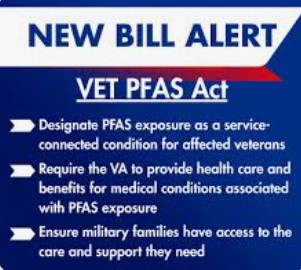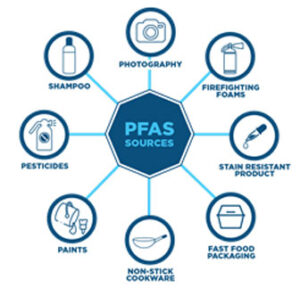A new bipartisan bill introduced in the House of Representatives could mark a groundbreaking shift in how the Department of Veterans Affairs (VA) treats veterans exposed to toxic chemicals, specifically PFAS, often called “forever chemicals.”
 Titled the “Veterans Exposed to Toxic PFAS Act” (VET PFAS Act), the legislation would designate PFAS exposure as a service-connected condition. That means veterans exposed during their time in the military could be eligible for VA disability compensation and healthcare benefits, opening the door for many who’ve suffered from serious health conditions to finally receive the support they deserve.
Titled the “Veterans Exposed to Toxic PFAS Act” (VET PFAS Act), the legislation would designate PFAS exposure as a service-connected condition. That means veterans exposed during their time in the military could be eligible for VA disability compensation and healthcare benefits, opening the door for many who’ve suffered from serious health conditions to finally receive the support they deserve.
What Are PFAS and Why Does It Matter?
 PFAS (per- and polyfluoroalkyl substances) are synthetic chemicals used for decades in firefighting foams and other industrial products. They break down very slowly—hence the nickname “forever chemicals”—and have been linked to a wide range of health problems. The CDC has noted that PFAS exposure may increase cholesterol levels, cause liver enzyme changes, impact fetal development, and raise the risk of certain cancers, including testicular and kidney cancers.
PFAS (per- and polyfluoroalkyl substances) are synthetic chemicals used for decades in firefighting foams and other industrial products. They break down very slowly—hence the nickname “forever chemicals”—and have been linked to a wide range of health problems. The CDC has noted that PFAS exposure may increase cholesterol levels, cause liver enzyme changes, impact fetal development, and raise the risk of certain cancers, including testicular and kidney cancers.
The Department of Defense has already identified 718 military installations with known or suspected PFAS contamination. Cleanup costs are projected to exceed $9.3 billion in FY 2025 alone, up from $2.6 billion spent since 2017.
What the VET PFAS Act Would Do
The bill—introduced by Reps. Josh Riley (D-NY) and Mike Lawler (R-NY)—would not only establish PFAS exposure as service-connected but also provide VA healthcare eligibility for certain dependents, including those who were exposed in utero while their mothers lived on contaminated bases.
Specifically, it seeks to ensure coverage for PFAS-related health conditions such as:
- High cholesterol
- Ulcerative colitis
- Thyroid disease
- Testicular cancer
- Kidney cancer
- Pregnancy-induced hypertension
The list of covered conditions would be developed jointly by the VA Secretary and the Department of Health and Human Services, based on ongoing studies directed by Congress.
Building on the PACT Act’s Momentum
 This bill builds upon the momentum created by the PACT Act of 2022, the largest expansion of VA healthcare eligibility in recent history. That legislation primarily addressed toxic exposure from burn pits, Agent Orange, and other combat-related sources.
This bill builds upon the momentum created by the PACT Act of 2022, the largest expansion of VA healthcare eligibility in recent history. That legislation primarily addressed toxic exposure from burn pits, Agent Orange, and other combat-related sources.
The VET PFAS Act would broaden that framework, especially by including non-combat exposure cases and extending potential care to dependents—something the PACT Act did not explicitly cover.
Why It Matters
Military families have long reported illnesses they believe are linked to base exposures—sometimes only learning years later that their homes were built on toxic soil or near polluted groundwater. Sites like George Air Force Base in California, now a designated EPA Superfund site, serve as painful reminders of past inaction.
Though the VA began the rule-making process to define PFAS exposure as a presumptive condition, progress has been stalled due to federal administrative changes.
This bill would remove that uncertainty, codifying benefits into law rather than waiting on executive rule-making.
If you or a loved one is dealing with health issues tied to military service, especially from exposure to toxic chemicals like PFAS, reach out to us. We’re here to help you navigate the VA system and fight for the benefits you’ve earned. Parmele Disability Advocates – Veteran Affairs. Disability advocacy for all.
